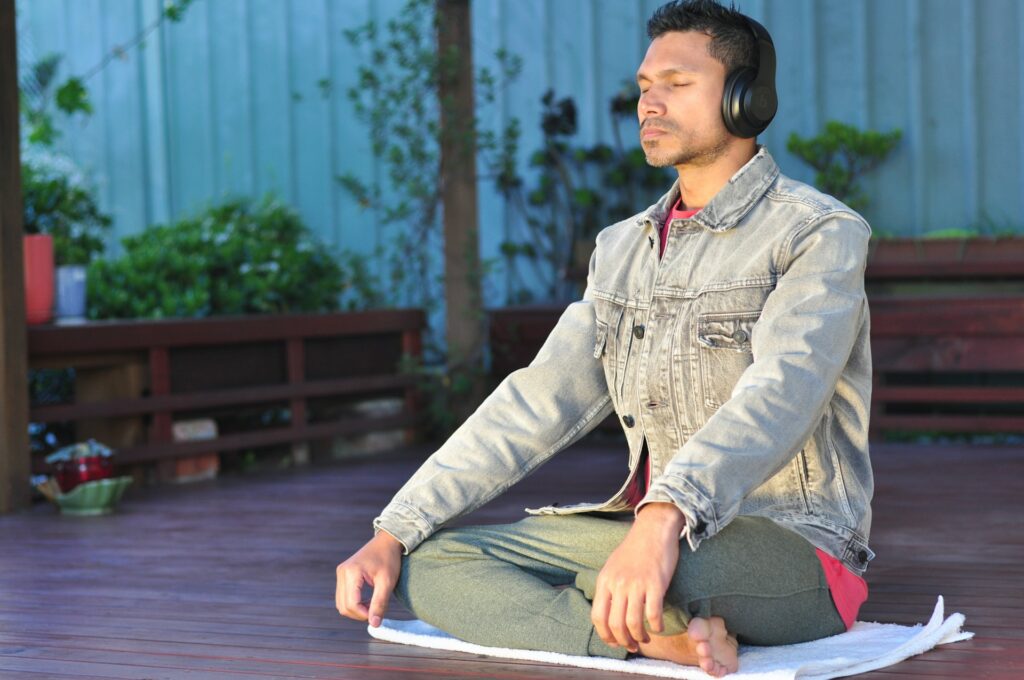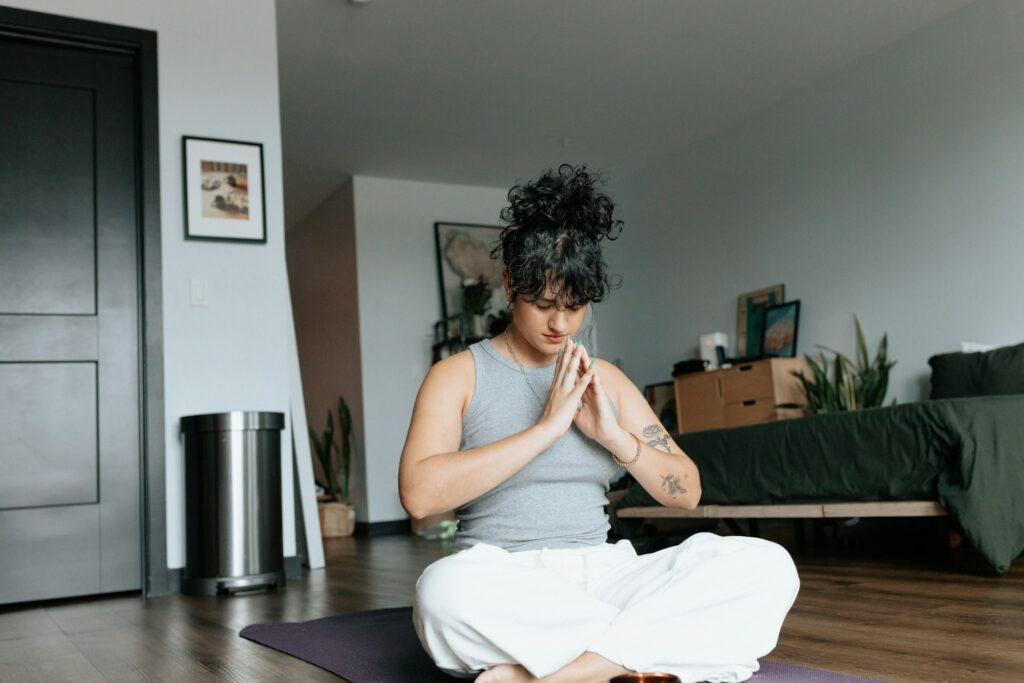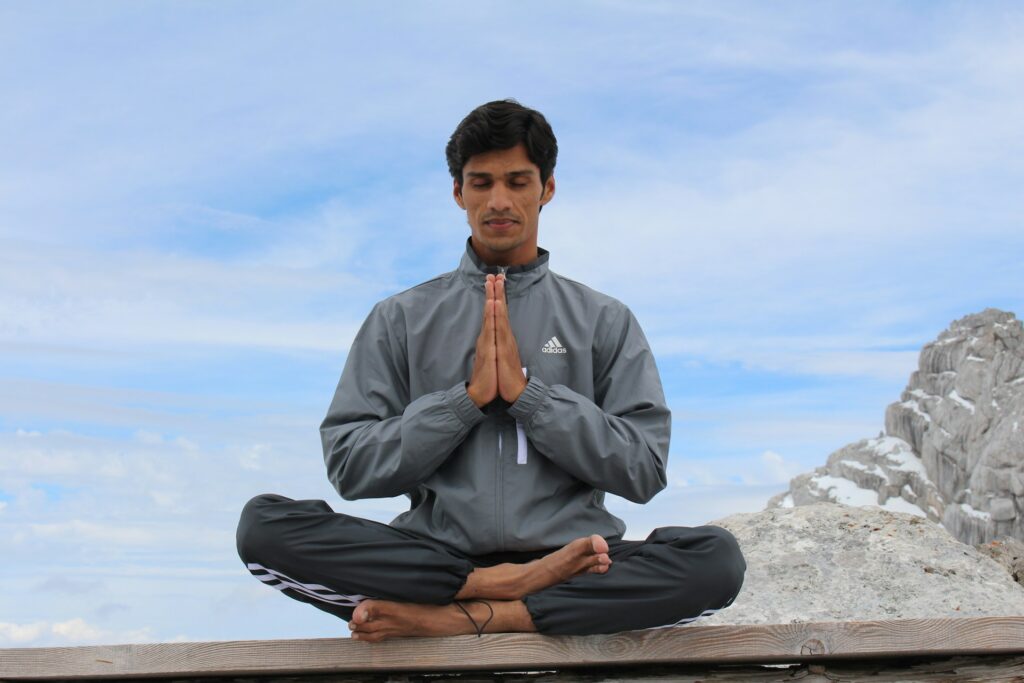If you’ve ever sat down to meditate and immediately thought, “This is boring,” you’re definitely not alone.

A lot of people assume that means they’re doing it wrong, or that meditation just isn’t for them. However, boredom in meditation isn’t a mistake—it’s actually part of the process. That gnawing frustration is actually your brain learning how to slow down. If you sit with it instead of running from it, boredom can turn out to be one of the most revealing—and useful—parts of the whole practice.
1. Boredom shows you how attached you are to stimulation.

We’re so used to having something to do, something to scroll, or something to solve that when it’s just us and our breath, our brain panics a bit. It starts hunting for something to latch onto—anything but stillness. Boredom reminds you how much of your mental world is driven by distraction. That discomfort is a clue, not a failure. It’s your nervous system reacting to the sudden drop in noise.
2. It reveals how uncomfortable stillness really is.

Stillness sounds peaceful until you actually try it. Then the mind starts pushing back. It gets twitchy. Bored. Anxious. Suddenly, you’d rather be anywhere else. That reaction isn’t random; it’s deeply human. Meditation doesn’t create discomfort—it shows you the discomfort that’s already been running underneath the surface. Boredom is often its first disguise.
3. It teaches you that not every moment needs to feel exciting.

In real life, we’re conditioned to expect highs: productivity, pleasure, insight. But meditation is about showing up, even when nothing special is happening. Boredom is a chance to practise staying instead of chasing. When you stop needing every moment to entertain or impress, you start noticing subtler things. Like how your breath changes, or how thoughts lose their grip when you don’t feed them.
4. It brings your craving for control into the light.

That restless itch to “make the boredom go away” is usually about control. You want to shift, fix, or tweak something because being passive feels wrong. Of course, meditation isn’t about controlling—it’s about observing. Boredom shows you where you struggle to let go. It asks you to sit with the feeling instead of escaping it. And that’s where the real work happens.
5. It helps you practise patience without a payoff.

Meditation doesn’t always come with clear results. There’s no gold star for sitting still. Boredom pushes against that, tempting you to quit because nothing flashy is happening. Sticking with it anyway teaches you how to be present without a prize at the end. That kind of patience starts bleeding into the rest of your life in really helpful ways.
6. It exposes your internal chatter without distraction.

Once you stop moving, all the inner dialogue gets louder. That running commentary that usually hides behind busyness has nowhere to go. You start hearing your mind’s background noise more clearly. While that can be uncomfortable, it’s also revealing. Boredom clears the way for you to actually notice what your mind sounds like when no one’s watching.
7. It highlights the difference between discomfort and danger.

Boredom feels like something’s wrong—but it isn’t. You’re not unsafe. You’re not failing. You’re just out of your usual rhythm, and your brain doesn’t love that. Learning to sit with harmless discomfort is powerful. It rewires your response to future stress and teaches your body that not all tension needs to be avoided.
8. It trains you to observe instead of react.

When you get bored during meditation, your instinct might be to move, open your eyes, or stop entirely. However, if you pause instead and just notice the urge, something shifts. You start learning how to observe discomfort without immediately acting on it. That’s a skill that’ll serve you way beyond the meditation cushion.
9. It teaches you how to stay when it’s not perfect.

Meditation sessions aren’t always blissful. Sometimes they’re messy, restless, and yes—boring. But showing up anyway is where the change happens. Boredom gives you the chance to practise commitment. To stay, even when it’s not impressive. That resilience carries over into all kinds of real-life situations where bailing isn’t an option.
10. It helps your nervous system settle—eventually.

The first 10 minutes might be a war zone in your head, but often, after boredom comes a drop in resistance—not every time, but enough to make it worth sticking with. That move into stillness usually doesn’t announce itself. It sneaks in quietly after you’ve given up on something happening. Boredom is sometimes the last barrier before that change.
11. It challenges your relationship with time.

Boredom stretches time. Two minutes can feel like 20, for sure, but what if that wasn’t a bad thing? What if part of what meditation teaches is how to be with time instead of trying to escape it? You start noticing that time isn’t the enemy. Your mind’s pace doesn’t have to dictate how you experience a moment. That realisation hits different once you’ve sat through enough boredom to feel it.
12. It encourages a gentler kind of awareness.

When you stop expecting meditation to wow you, you start seeing what’s actually there. The tiny shifts in your breath. The way thoughts rise and fall without you doing anything. The quiet rhythm under the noise. Boredom lowers the volume enough for you to notice those things. The more you notice, the more grounded your awareness becomes—without trying so hard to get it right.
13. It reminds you that being human isn’t always exciting.

Meditation isn’t about becoming a perfect being; it’s about being with your humanness. Boredom is part of that. It’s the awkward pause, the silence between songs, the quiet that lets the rest of life breathe. Instead of running from it, meditation invites you to sit with it. To be bored, and still be okay. That’s a kind of peace most people don’t even know they’re allowed to have.
14. It’s often the doorway to something deeper.

Boredom isn’t the end of the practice; it’s usually the beginning. It means you’re past the surface layer of thoughts and distractions, and you’re finally sitting in the stillness that’s been there the whole time. What you do next matters. If you lean in, breathe, and just let it be boring for a bit longer—you might find that something softer, truer, and unexpectedly real starts to open up right behind it.


